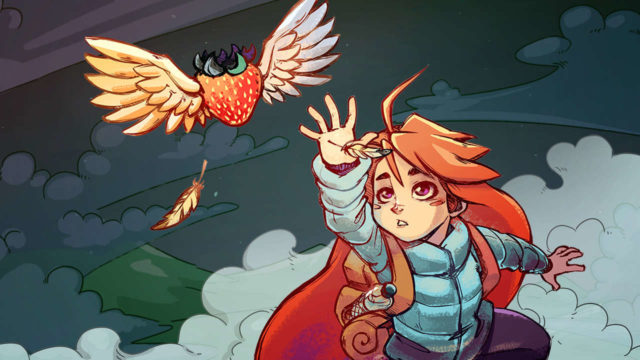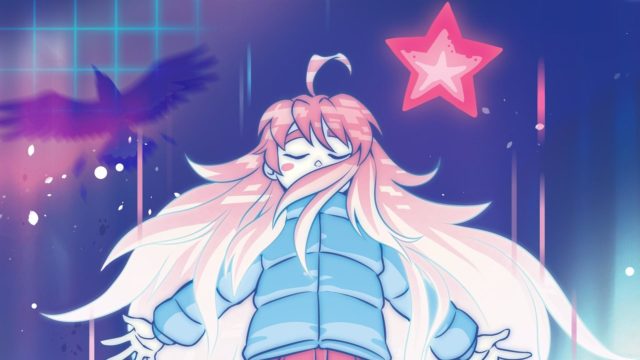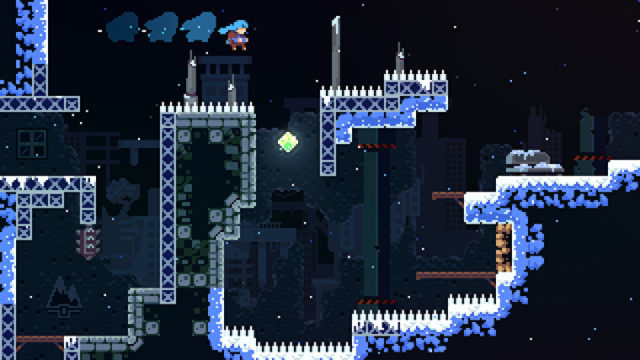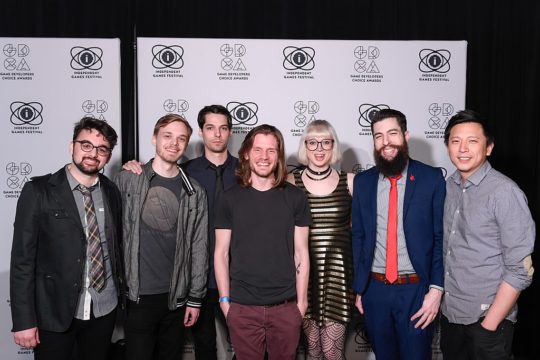I was surprised when I logged onto Twitter earlier today to discover that the Chapter 9 DLC which just came for indie platformer Celeste had caused quite a furor in the gaming community. My gut reaction was that maybe it was riddled with bugs or did something bad with the mechanics. As it turns out, the controversy has nothing to do with the gameplay, but instead the narrative. Spoilers are ahead for those who haven’t played Chapter 9, so please turn back now if you want to experience the story on your own.
At the end of Chapter 9 it’s heavily implied that the game’s heroine Madeline is transgender. There are several clues that intimate this revelation:
- A photograph of a young Madeline shows the character with very short hair, which suggests she might have been assigned male at birth.
- A bottle of pills that could either be antidepressants (which would fit with the themes of the story) or a regimen for hormone replacement therapy.
- Gay and trans pride flags on her desk.
The LGBTQ+ community has taken to the internet with a great deal of enthusiasm and passion for this possible reveal. A big reason for this jubilation is that among a vast majority of the LGBTQ+ community there is a sense of marginalization within both society and mass media. To have the star of a breakout sensation like Celeste be revealed as trans is something that many LGBTQ+ people feel is a step in the right direction in terms of representation.
The importance of representation isn’t immediately apparent to some, but I think that’s partially because what it means isn’t universal to everyone. What representation means to me as a Mexican-American isn’t necessarily what someone else who’s Hispanic thinks that it should be, for instance. In my own personal experience with mass media, however, if there’s any singular qualifier for representation that I think is fairly common, it’s that the people who traditionally aren’t shown in movies, games, TV shows, and so on want to be seen, and as authentically as possible.
For many people in the United States who don’t fall into any of the communities that find themselves on the outskirts, it’s sometimes difficult to understand why representation matters or why it’s such a big deal. While I take issue with representation when it seems to veer into being pandering or tokenizing, and while I also am not emotionally invested in needing to see people who look like me in mass media, I understand why it matters to those who seek it. It’s incredibly hard to spend your life feeling like an outcast, or to be ostracized for being different.
With Celeste and the possibility that she’s actually a trans woman, there are some who are taking to social media to decry this development. Some of the disparaging comments range from how Celeste is left-wing propaganda to the game being a gateway to hell. Some of this talk is rooted in religious fundamentalism, but some of it is also political in nature, too. So, while there are plenty of people thrilled by a potentially new trans hero to root for, others are dismayed that they were “suckered” into enjoying a game starring someone whose sexual identity is something they’re diametrically opposed to.
Before I proceed, let me be clear: I’m not here to tell anyone how to think about trans rights, the LGBTQ+ community, or anything else. I understand that there are a myriad of reasons why people feel how they do about these issues. What I’m also not here to do, though, is support outright hate. If someone wants to reassign their gender, or identify as non-binary, or anything else, I feel it’s their business and their right. The freedoms of the United States are a big reason why I love this country. I don’t necessarily agree with everything the LGBTQ+ community has to say, but I sure as hell support their right to have an opinion and a voice.
Developer Matt Thorson identifies as non-binary. Composer Lena Raine is transgender. That they might feel inclined to create a game with a trans heroine shouldn’t be a surprise to anyone. Still, it’s not like that’s listed in the game’s credits— it doesn’t explicitly state that these creators are part of the LGBTQ+ community. Yet, even if that’s not the case… so what? Technically, Thorson and company are being generous and not outright saying, “Madeline is trans.” They’ve seemingly left it open to interpretation. It’s there for those who want to see it. Maybe Madeline is just supportive of trans and gay people. There are any number of ways to take the ending.
Some might take that as a copout; why not just explicitly state Madeline is trans? There are any number of reasons why Thorson and their colleagues chose not to do this. Looking at some of the negativity surrounding Chapter 9, I think I can see why there might be some reluctance on their part. It also might boil down to the player’s own sense of connection to Madeline; the game has been out for a year and perhaps the devs thought it would be unfair to retroactively alter the relationship between player and character that’s been rooted for so long now. That’s entirely a guess and largely irrelevant because Thorson and anyone else who made this game have every right to tell their story how they see fit.
What I believe should be the biggest takeaway from this debacle is that it doesn’t matter if Madeline is trans. What’s ironic is that there are many pundits on social media who claim that they wouldn’t mind the inclusion of LGBTQ+ and other marginalized people and groups if the messaging wasn’t so “in their face.” They often claim that they’d be more willing to accept these inclusions if it wasn’t “beaten over their heads.” Well, if Madeline is indeed trans, then this is exactly what that crowd is asking for. There’s no hullabaloo about it. No grand reveal. It’s a couple of Easter eggs that fans can spot, not spot, interpret how they want, or ignore entirely. Madeline is (maybe) trans. The end.
When Metroid hit NES back in 1987, a big part of the experience was reaching the finale of the game and seeing Samus come out of the Power Suit. In a bold, gutsy move by Nintendo, it was revealed that the character was not a man, but rather, a woman. It’s impossible to go back in time and gauge how many fans were or weren’t happy with this. If the world of 2019 is anything to go off of, it’s possible that the hypothetical Twitter of 32 years ago might have been filled with tweets from people aghast that they were forced to play as a woman without knowing it. Yet, considering how Samus has since gone on to become the quintessential female hero in all of video games, I’d like to think that maybe people were able to come to terms with her gender and embrace Samus for who she is.
With Celeste, I don’t know that Madeline will ever quite rise to the fame of Samus, but she certainly shouldn’t be a source of infamy. Despite what many people like to claim about the video game industry and its fans, there has been representation of LGBTQ+ characters quite a bit over the years. It’s also home to countless fans who identify as queer, gay, trans, and many other forms of orientation. A simple search of #cosplay on social media will reveal quite the rainbow of people who have found their place in the world in the embrace of video games.
I refuse to pretend that the incensed who have taken to the internet to rage about Celeste are representative of the gaming community as a whole. They’re not. There’s a lot more acceptance here than arguably most other fan communities in the world. Again, I’m not saying that people need to feel a certain way about Madeline possibly being trans. At the end of the day, how anyone identities with a character is personal to them and their choice. I’m simply invoking a call to people for basic respect and humanity. If Madeline is trans, no one has been “indoctrinated” by playing Celeste. It’s just a character in a game who might not be like you. I’m certainly not a bombshell blonde mercenary, but I love Samus and Metroid all the same. Celeste and Madeline deserve at least the peace to exist as they are.




 ShareThis
ShareThis









